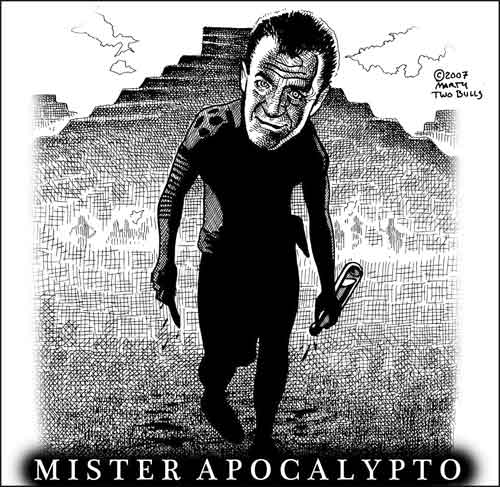Gibson's movie will make serious money, no doubt, and will probably win awards, popular culture in America being what it is. Already some Latino groups and some American Indians are praising it for its employment of our ethnic brethren, while its critics get slammed for “political correctness” and sour grapes. So it goes. Given Gibson's passion for Christian civilization as the answer to humanity's inhumanity, however, one can only surmise that “Apocalypto's” final scene, where the distraught protagonist encounters the incoming Spanish Christian conquest, is the director's signal for the “new beginning” he keeps professing. But those of us who well remember the real Maya holocaust, early ushered by Conquistador Pedro de Alvarado but culminating in the 1980s with the professed Christian regime of the born-again dictator, General Efrain Rios Montt, will not be mesmerized with this shameful entertainment. For myself, I can still see the ravaged face of the Quiche Daykeeper's widow, only 20 years ago, as she recalled the bloody sacrifice of her husband by the glinty metal knives of executioners still carrying out their brutal work in the name of Jesus Christ.


3 comments:
You're the one who touted your research-based knowledge of the Maya. Why did you bother, I ask again, if Apocalypto wasn't supposed to be historically accurate?
I'm "going after" Apocalypto and not Children of Men because the former stereotypes Native people and the latter doesn't. If you think I've skipped some cases of Native stereotyping because they're too "hard" or whatever, feel free to name these cases. I presume you can't because I haven't skipped anything. I've been consistent in criticizing Native stereotypes wherever they occur.
People are criticizing Apocalypto because it deserves to be criticized, not because "it sits in the path of least resistance." That the criticism is merited is shown by the inability of you or anyone else to defend its mistakes and stereotypes.
As for the connection between media and violence, I've written about it extensively in The Evidence Against Media Violence. Here's how one article summarized the data:
Today the data linking violence in the media to violence in society are superior to those linking cancer and tobacco. Hundreds of sound scientific studies demonstrate the social impact of brutalization by the media. The Journal of the American Medical Association concluded that "the introduction of television in the 1950's caused a subsequent doubling of the homicide rate, i.e., long-term childhood exposure to television is a causal factor behind approximately one half of the homicides committed in the United States, or approximately 10,000 homicides annually." The article went on to say that ". . . if, hypothetically, television technology had never been developed, there would today be 10,000 fewer homicides each year in the United States, 70,000 fewer rapes, and 700,000 fewer injurious assaults" (June 10, 1992).
Hernán Cortés acabó con el canibalismo en Méjico
The Journal of the American Medical Association peer-reviews its articles. It approves them before it publishes them--puts its stamp on them, so to speak. So your quibble about who said what is basically semantics.
JAMA reported on a study that determined the effects of introducing television. The relationship it found was supposedly causal. If A and only A caused B, it's valid to say if not A, then not B.
In the first three paragraphs of my response, I offered three challenges. Once again, Russ, you didn't rise to the challenges. If your plan is to let me win every debate, you're doing a fine job of it. Keep up the good work.
If you want to talk logic, you can explain this one to us. Russ Bates researched the Maya. Mel Gibson researched the Maya. Therefore, Russ approves of Mel's research. Or Mel's research is accurate. Or Mel's research doesn't matter because movies aren't supposed to be accurate. Or another equally muddled conclusion.
Post a Comment